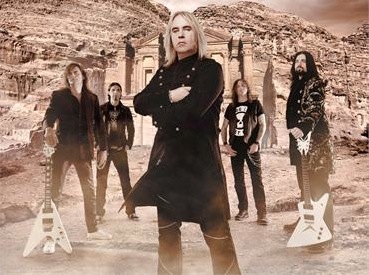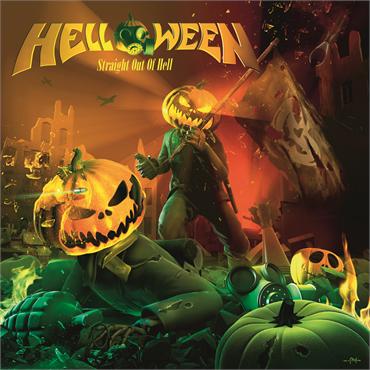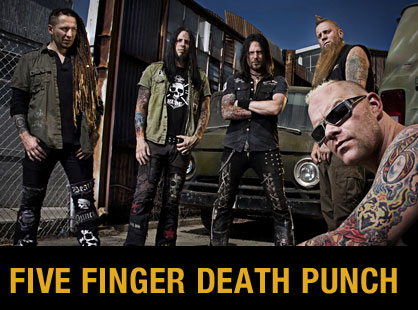Helloween were always prepared to live another day

It’s December 21 and the Maya civilization were dead wrong. The world is still turning, life carries on, no apocalypse, and German speed metal icons Helloween were always prepared to live another day. It’s all “complete bullshit,” reckons Andi Deris, Helloween’s singer. “We will all survive the year 2012 and face an even more positive and energetic future.” The name of the band’s new album, Straight Out of Hell, seems to capture the fiery explosion of positive energy Deris is describing. And upon the album’s release on January 22, 2013, the predictions of the Maya calendar, unlike Helloween, will be a forgotten news clip.
The following is a Powerline interview with guitarist and co-founder Michael Weikath.
Is this the end of the world on December 21, or what? (laughs)
Michael Weikath: Well, your government, as well as the Russians, you know, have I think released a statement that, with the Mayan calendar, or whatever has been misquoted, that nothing’s going to happen on the 21, and that’s what we’ve got our governments for, right? To give us clear information about things and to tell us the truth, so maybe we should rely on them. As Britney Spears once said, ‘Why don’t we just do what our government tells us.’ (laughs)
Your singer Andi believes civilization will not only survive but, in his words, “survive the year 2012 and face an even more positive and energetic future’? Do you believe the same?
Weikath: Well, at least that’s what Nostradamus has been babbling about over time and in his, whatever you call it, ramblings. He speaks of the year 4000 and that there’s like a bright future. That’s what he says. And there are other predictions that say on the 6th of January we will be elevated to another kind of dimension. That kind of correlates then, what he says and they say. I don’t know. I have nothing against bright futures, you know. All the best to everyone on this earth.
You seem to like debunking these myths and legends.
Weikath: In fact, we don’t know much about it, you know. We’re not like the masters of legends and mysteries and all that. We just pretend to be. And then you’ve got something there that you can write about and entertain people with. Nothing serious. It’s not like anyone of us know anything. (laughs)
Now, you’ve said that the new album is “a continuation of the 7 Sinners directive” but more positive. Maybe you can explain that a little more.
Weikath: It’s just the way of working and the lineup that we have now, since more or less ten years. And you just know that you’ve got a good outfit and what are the strengths and what are the weaknesses of everyone. And you come up with new tracks, you upload them onto an internet server and you download them, listen to them and then pick the tracks that you want to take on the album. It is a feasible way of doing things and that’s what we’ve been doing ever since Gambling with the Devil (2007), 7 Sinners (2010) and now this one. And you get good results, you know. Everyone has tracks at home and gets prepared for the recordings, for the actual ones at the studio, in person, with the producer, Charlie Bauerfeind. And when it’s done you just travel back home. We’re spread over Germany — like, one guy is in Berlin, the other guy is in Hamburg and others in the south of Germany or the middle of Germany — and then there’s a guy like me who lives in Tenerife (Spain). And, so, we always orchestrate that stuff there and we’ve had great results in the past. In that way it is a continuation of the workflow that we’ve adopted.
Well, most of the members of the band contributed to the songwriting on the last album. Is it pretty much the same for the new album?
Weikath: Yeah, it’s written by the same guys but it’s like a different variety. Producer Charlie Bauerfeind said he wants to optimize and put in the old trademarks again like huge choruses, big orchestration and shiny sounds and all this. Paired with the other modern elements that Helloween also stands for, meanwhile, and that has been combined so we have a very accessible, open, good sounding record, I’d say. He tried to let everything sound a bit more loose.
 One of the songs that made an immediate impression on me was “World of War.” I think it was the thrashy sound mixed with melody. Great combination.
One of the songs that made an immediate impression on me was “World of War.” I think it was the thrashy sound mixed with melody. Great combination.
Weikath: And it says it like it is. If you’re pretty cynical or whatever, you say, ‘Okay, all these things are repeating.’ I get to read like ‘Is Syria going to use weapons of mass destruction?’ and then I get to go ‘There you go again.’ ‘Is that what they’re doing? Ok.’ But what you get to hear and the way it’s being treated by the media, it’s getting to be more or less the same each time. So it’s a World of War. It’s like a template that’s getting applied, and then people being insecure about it and keep them in a constant panic. There’s someone behind the whole thing that does that. Then there is the Syrians and the guy who leads them going ‘Oh, I don’t care. I’ll just kill all my people here if they don’t live up to my expectations.’ Have a look at it. World of War.
It’s 2012, you’d think the world would learn by its past mistakes with war.
Weikath: You may say that there are things hindering things or not. I just think we could have had different things but … I’m 50 years [old] now. And I’ve seen a few things. And when I’m 90 what am I going to say? ‘It’s all still the same, basically.’
“Burning Sun” is your song. And there is going to be a limited edition featuring a bonus ‘Hammond version’ of the song, in memory of Deep Purple’s Jon Lord. Was the band close to Jon, or is it a tip of the cap due to his influence?
Weikath: I just met him on his birthday once. They had a concert in Hamburg and afterwards they went to a club they knew because they had been there already during the ’60s, during their time in Hamburg, the deep Purple guys, and so I went there and said hi. I approached him and gently touched his shoulder and said ‘Look, I’m Michael Weikath of Helloween and I’ve always admired your stuff and I wish you all the best for your birthday and your future.’ He said thanks and we shook hands and he said ‘I really appreciate what you said, Michael’ and that’s that. They’re legends and when he died it surely impacted me because I’ve always loved the music he did with Purple and also the solo stuff he did. He’s a musical genius, that guy.
READ POWERLINE’S REVIEW OF THE NEW ALBUM, STRAIGHT OUT OF HELL
As far as German metal: Do you think German metal bands have a good camaraderie?
Weikath: Actually, I don’t know many [bands]. I just like the ones that are around the same age, that you know and you respect each other.
Well, Helloween was one of the first German speed metal acts, and there were a few before you, like Accept. They must have been a big influence, right?
Weikath: Oh yeah, yeah. We just wanted to surpass what they were doing. We were saying ‘okay,’ with everything a bit faster, a bit more complicated. They were one template for [us]. We were not expecting to have many record sales in the beginning, but we wanted people, as they left the venue, to still remember most of the tracks, that they could whistle or hum it. and that way, you’re gonna have to apply things like Accept were doing, and the Scorpions with that twin vocals stuff. And these are the templates that you want to use in order to achieve [success]. Luckily we got kickstarted after the first few recordings.
Your early albums are considered by many to be the band’s masterpieces. There had to be a lot of pressure after that to try to outdo those albums. Or was that never on your mind and you just moved on?
Weikath: We just moved on because we had things on our minds that we wanted to do: Play something progressive and have a singer in the middle of everything. So there are musical structures that you have as a band where you can convey anything you want and [the singer] just sings on it. And that’s been the basic idea because if you’re a four-guy outfit, the one guitarist who sings, he can’t practically play all these musical structures while he’s singing if those act against the structure of the vocals. So he would always have to kind of stick to something that fits the singing, and so you are limited in that way, and that’s what we wanted to change. We wanted to have a proper singer. We were doing fine early enough that we had the early records with Kai Hansen doing vocals. And then Kiske eventually entered the band.
Do you still keep in touch with Kai Hansen and Michael Kiske?
Weikath: If you read the interviews with Kiske saying something … he still says he has a problem with me so that has to be sorted. We have to eventually have a talk or whatever, sort things out. If you ever want to do some ‘reunion’ activities in the form of public appearances with ex-members or recordings with particular tracks. If you want to do something, you at first have to sort things out. He seems to have a problem and I’ve heard that he is maybe willing to have a talk about this because this eats at you, you know. If you have trouble in public … it’s not exactly easy for anyone. You don’t just carry that with you. You want to have a talk. And that’s what is going to take place one of the other times.
Life is too short to carry on quarrels about the past.
Weikath: Right. You know, you’re so busy, like everyone’s doing one’s projects and you always think like we can have a phone call or we can write an email and then you don’t do it and you proceed with the other things. And then you go ‘Oh, I wanted to talk to Weikath but I’m not in the mood right now or I’ve got this to do … ‘ And that can happen. And the same goes for me.
Throughout the band’s history, Helloween never changed to appease a record company. You stayed creatively true and you must be proud of that, no?
Weikath: Yeah, even though there was the move during The Dark Ride (2000), it was tried to equalize the Helloween sound with the grunge scene at that time, to appear more cynical, more dark, more sinister or whatever, to maybe cater to what was going on then at the time. So that was the point but it wasn’t actually pushed on us by a record company. It went on by our own accord. And i really didn’t cherish that idea, I must say. But on the other hand, if you’ve got that record, and there are many people who love it and … what the heck, you know.
Being there from the beginning, of course you experienced instability with the band’s lineup, but were you ever concerned about the band’s longevity? Or did you always feel confident that the band would always persevere no matter what?
Weikath: No, there were times when everyone felt pretty hopeless, you know. But you just have to carry on. It’s not that we can just take on office jobs or whatever. Like Marcus [Grosskopf] is not fit for that. I’m not fit for that. You have your capabilities but there is always someone already doing it better and a longer time than you. So to us, it was like we got to carry on and persevere.
And you have.
Weikath: Yeah, you got to somehow. No other way.
It’s great that you are able to do such creative things with your songs and not feel like you have to contain them to, say, five minutes or whatever. Do you ever worry that the listener, with today’s shorter attention spans, would lose interest?
Weikath: No, there’s a niche. And there’s a history of doing long songs. If you were to take Ted Nugent’s “Stranglehold” or UFO “Rock Bottom” and stuff like that. Long tracks. We just wanted to bring it across as well — like, the time, the ’70s, no one can remember nowadays, it was crazy. People were hanging out, smoking pot and they went to a club and then they listened to the recordings and they were flying on their whatever and if you had a long track it was cool. Shaking your head to that and getting the mood, But those were the ’70s. And that’s when this stuff was generated. And you just want to be on that thing as well, as a band you say I want to do one or the other long track with impressive stuff. And the thing with attention spans — if you look at these old hits, be it Motown, be it The Beatles, The Monkees or whatever, they were always like 2:20 minutes. That’s the other field of hit material. You try to keep that stuff short, yeah. If you have a super song going on and a real hit than it doesn’t need much more than 2:20 to be memorable to sell. And that’s been the calculation of record companies for all time. I think even Caruso, they would have gone to that guy and said ‘Okay, keep your tracks as short as possible.
Vinyl helped [when it came to longer songs]. Nowadays, with MP3s and CDs, listeners will sometimes be hopping around to and from all different tracks. With an album, you sit down listen to it, there are those who think it’s a better overall experience.
Weikath: Yeah, sure, and it is rare that you put in a CD or something and it sounds as good or has the impact a vinyl record has, along with the amplification you need for that and that’s lost. Most people don’t even know what it’s like. I mean, they get the bass boosters in their car and it’s impressive and all but it doesn’t live up to vinyl recording being played on a stereo amplifier. You just don’t really get that, If you take The Beatles remastered CD editions… yeah, that sounds better than vinyl but I wouldn’t know where to turn to and give you more examples where the CD sounds better than the actual vinyl. That’s so rare.
Will Straight Out of Hell come out on vinyl?
Weikath: Yeah, for sure. We’ve had all the records on vinyl. The better the CD mastering is, the less of a difference you will have on the vinyl versions later on. There have been a few Helloween records like Gambling With the Devil (2007) where the difference was not really noticeable. It was more or less the same sound.
What are the plans for a tour?
Weikath: We’re going to pick some key cities. We’re going to play where it is feasible to do so and it’s going to be like the last time we’ve done it. The last time was really really good. We had happening clubs, we had happening people and we had a happening tour. And we are trying to repeat that, the same way.



Leave a comment